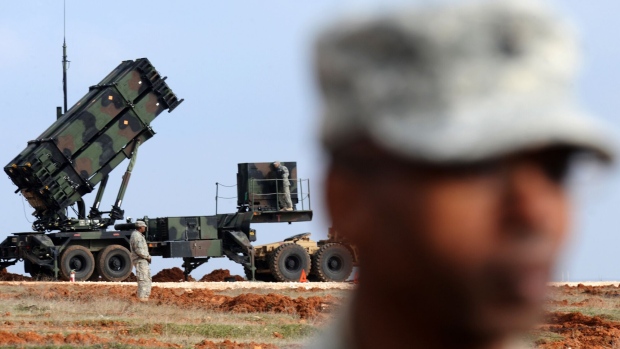Apr 23, 2024
Germany Raises Pressure on US to Step Up Kyiv Air-Defense Aid
, Bloomberg News

(Bloomberg) -- German Chancellor Olaf Scholz’s government is pushing the US to deliver at least one more Patriot anti-missile system to Ukraine to help close the air-defense gap as Russia escalates a barrage of attacks, according to people familiar with the matter.
Berlin’s pressure campaign aimed at its transatlantic ally is part of a coordinated effort to get NATO and European Union partners to step up assistance for Ukraine on air defense, the people said on condition of anonymity. Germany will also keep pressing European allies this week, including France and Italy, to assess what they’re able to deliver.
Germany’s prodding is something of a role reversal for Scholz, whose government has often been pilloried since Russia’s invasion for dragging its feet on weapons deliveries. The German leader has maintained his resistance to sending longer-range Taurus missiles to Kyiv, arguing that such deliveries risk making the country a party to war.
But Scholz has spearheaded an effort to send more Patriot and other air-defense systems to Ukraine as the war-battered nation sustains increased attacks that have destroyed parts of its energy infrastructure and city centers. The chancellor said last week Germany will send a third Patriot battery — and that six should follow soon from other EU member states.
For the German military, three Patriots would account for a quarter of its arsenal, a far larger proportion than the US. Other hardware as part of Berlin’s appeal are Samp/T ground-to-air systems, NASAMS and Hawk missiles, Iris-T systems as well as parts and funding to support those efforts.
Kyiv has asked allies for at least seven more Patriot systems earlier this month, but has so far only received the German commitment. That pledge will bring the number of Patriot systems provided by Germany to three.
Missile, Drone Barrages
German Economy Minister Robert Habeck cited the “extremely high numbers of drones and rockets” targeting Ukraine and called air defense the most pressing need for Ukrainian forces.
“If the Americans could send over Patriot systems that would help enormously,” Habeck said Monday in an interview with Deutschlandfunk radio.
Spokespeople for the White House National Security Council didn’t immediately respond to a request for comment.
Ukrainian officials lauded passage in the US House of Representatives of a $61 billion military and economic aid package that was held up for six months amid Republican resistance. But Kyiv’s forces in the meantime have suffered painful shortages of ammunition and manpower as the Kremlin exploits the vulnerability.
Ukraine’s second-largest city, Kharkiv, has come under sustained missile and drone bombardment in what Ukrainian and Western officials see as a Russian attempt to force an evacuation of the city.
As the attacks escalate, Ukrainian President Volodymyr Zelenskiy has increasingly called for more air defense. He called the issue a top priority after the US legislation passed over the weekend.
“We will have a chance at victory if Ukraine really gets the weapons system, which we need so much, which thousands of soldiers need so much,” Zelenskiy told NBC’s “Meet the Press” on Sunday through an interpreter.
Some of the equipment tied to the US package, which will likely include longer-range Army Tactical Missile Systems, or ATACMS, could be on the way by the end of the week, Democrat Mark Warner, chairman of the Senate Intelligence Committee, said on CBS’s “Face the Nation.”
US President Joe Biden told Zelenskiy on Monday that his administration would move quickly to distribute security assistance if the Senate votes this week to approve the aid package. During a call, Biden said the US aims to swiftly ship the battlefield and air defense assistance, the White House said in a statement.
It’s not the first time Scholz has sought to pressure Biden. Last year the chancellor made the shipment of Leopard 2 battle tanks conditional on Washington’s contribution of Abrams tanks. After initial resistance, the US administration agreed to deliver the armor.
Separately, NATO officials have been in contact with manufacturers to discuss ways to speed up deliveries and ramp up the production of interceptors, another person said. Allies are also exploring re-certifying old or expiring Patriot missiles as well as the possibility of re-purposing batteries currently used for training.
(Updates Habeck quote in the seventh paragraph.)
©2024 Bloomberg L.P.








